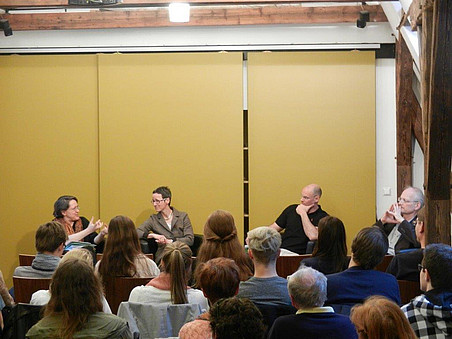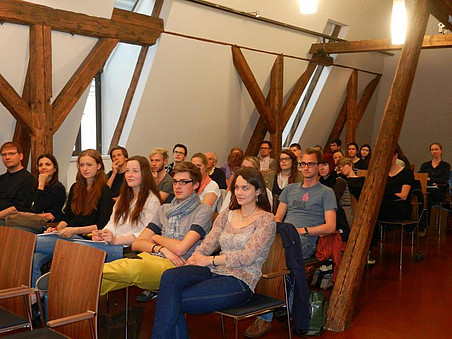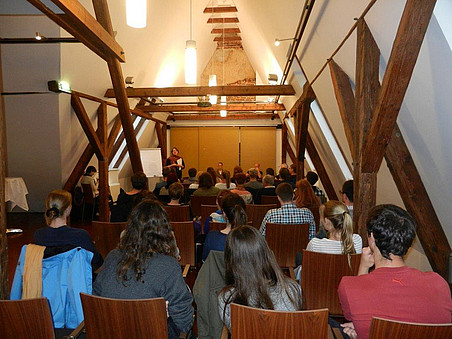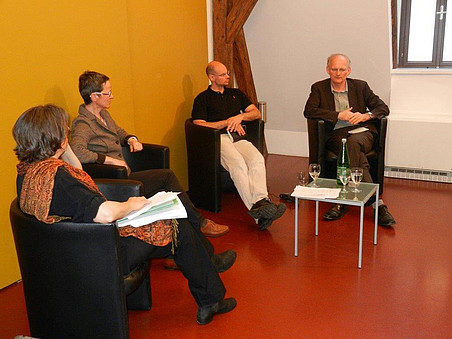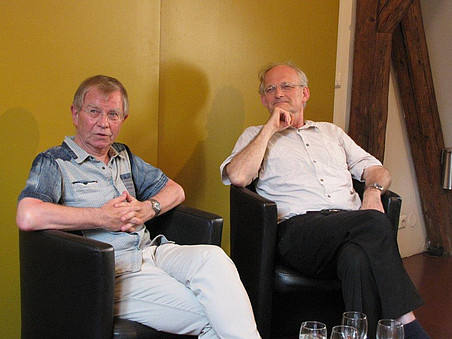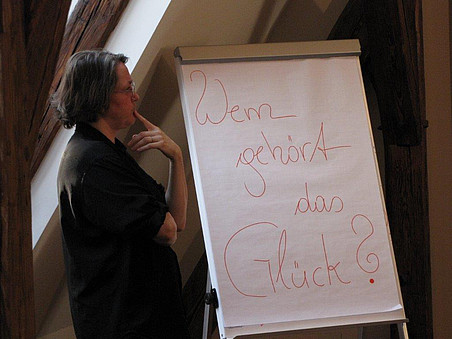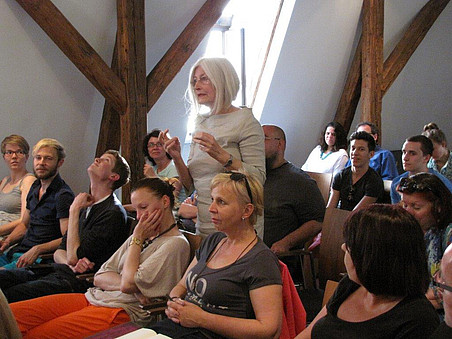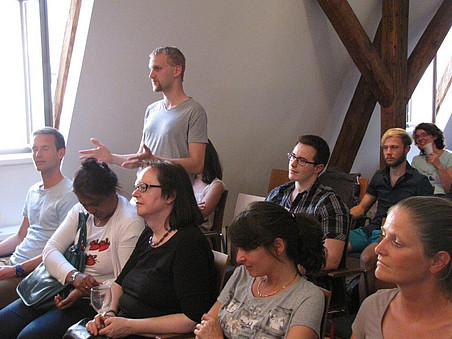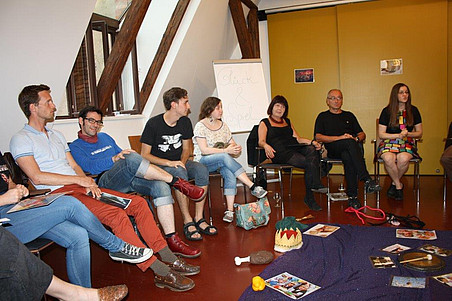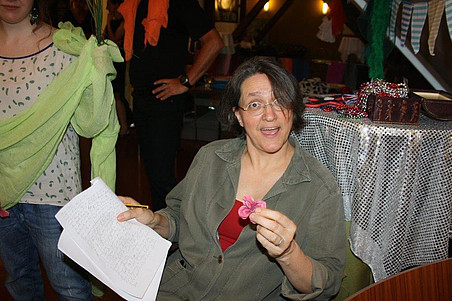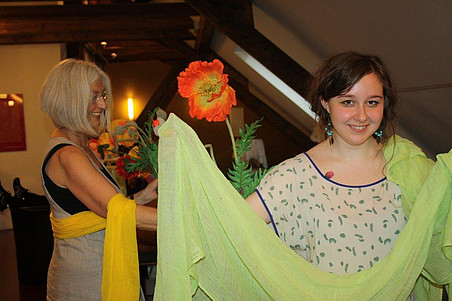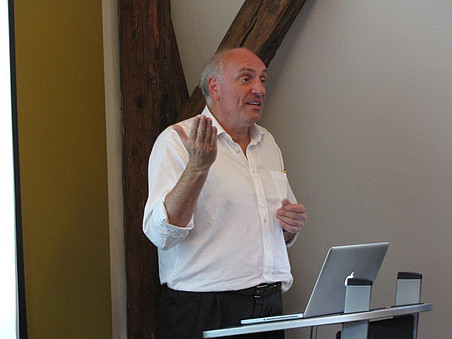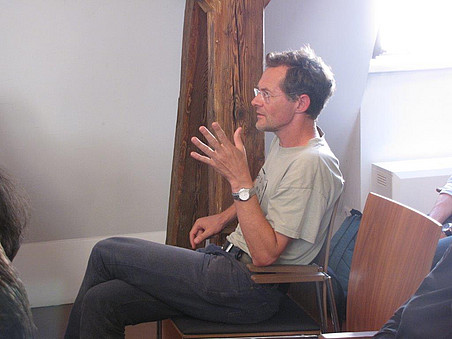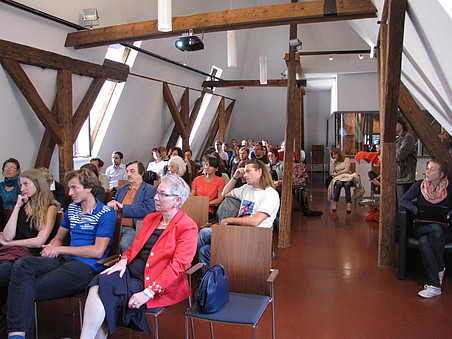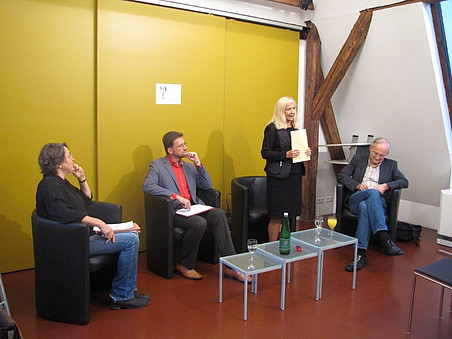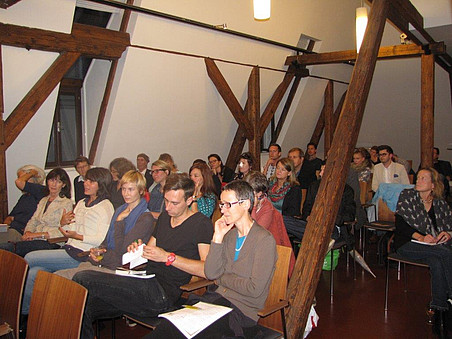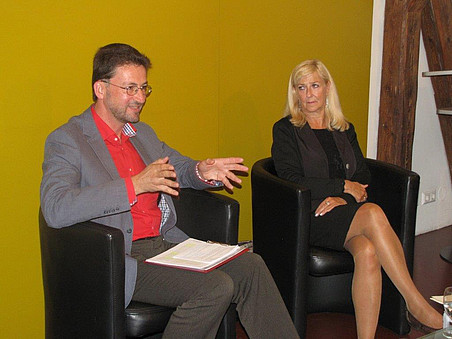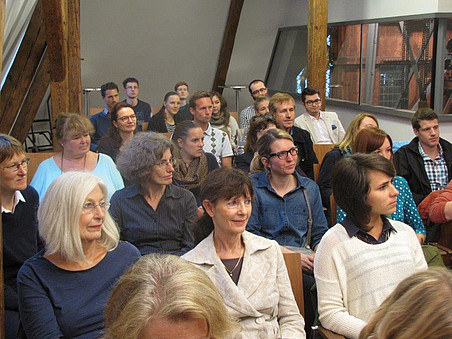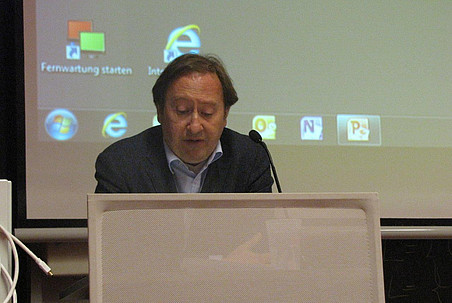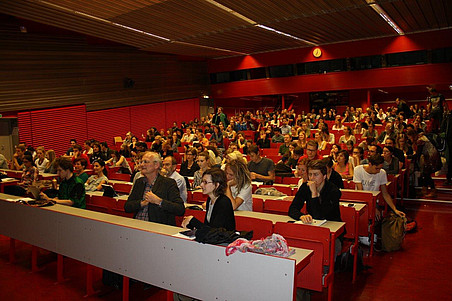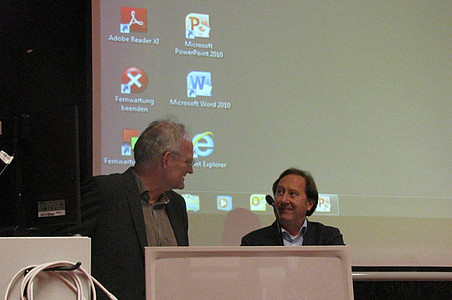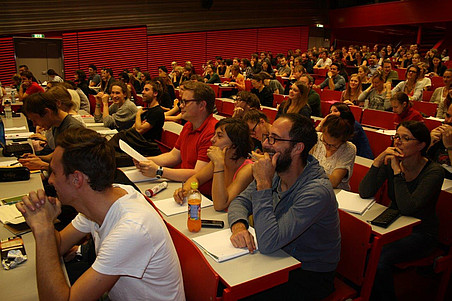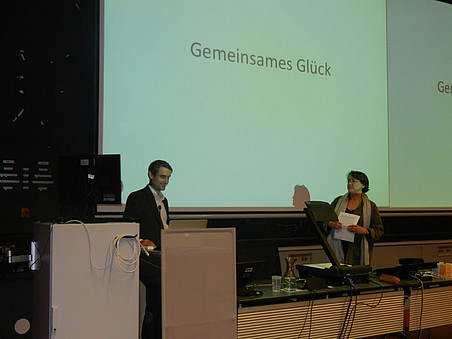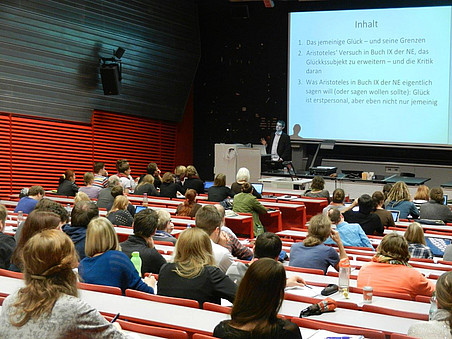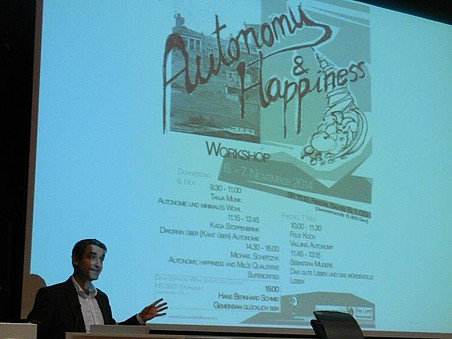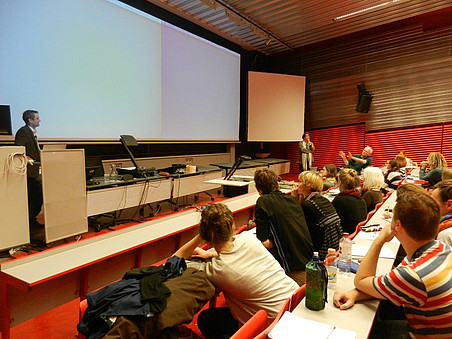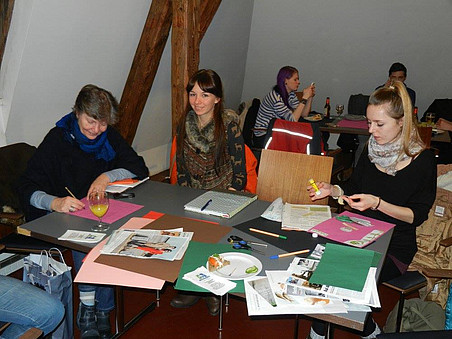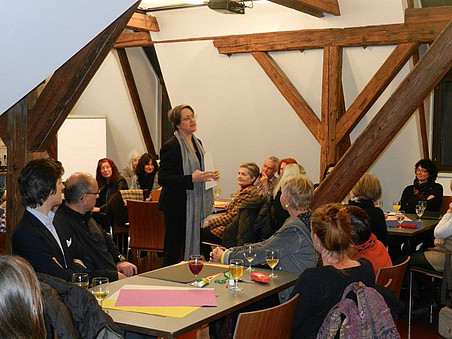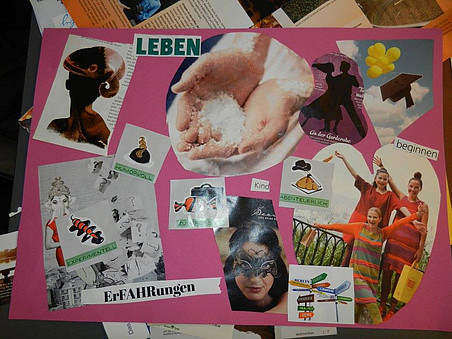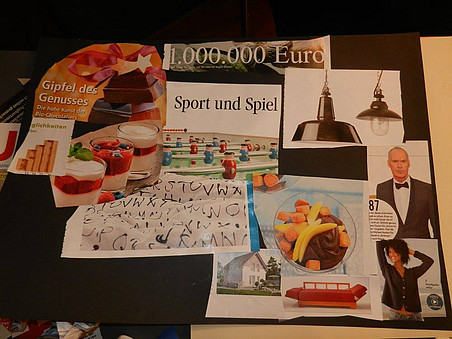Whose happiness is it?
Denkzeitraum 2014
Denkzeitraum on happiness and movement on 24 April 2014
Is happiness stagnation or do we need the release of serotonin to be happy? We talk about this with Sylvia Titze, Professor at the Institute of Sports Science in Graz, and Thomas Schneider, Course Director at the University Sports Institute Vienna.
Denkzeitraum on happiness and couple relationships on 22 May 2014
Growing old together and staying happy forever - that's what all couples want. But is that even possible in the long term? What are we doing wrong when our longing for enduring happiness as a couple turns out to be an illusion? Psychologist and couples therapist Klaus Heer reflects aloud on these existential questions in the second period of reflection and looks for new perspectives.
Denkzeitraum on happiness and play on 12 June 2014
Is everyone the architect of his/her own happiness? The Jeux Dramatiques method brings happiness into direct experience. Under the guidance of Klara Gruber, we will engage in an expressive play based on our inner experience of happiness.
Graz potlucks on 10 May, 14 and 27 June 2014
Guests bring a dish to the potluck and then eat it together. Everyone is invited to the happiness potluck in Graz's Griesgasse who not only wants to contribute a cake, fruit or a drink, but also their own opinion and idea of happiness and the good life. We will eat together and talk about happiness.
The potlucks bring the scientific discussion about happiness into the public sphere. Three conversations about happiness while enjoying good things together in three different places.
1. who owns happiness in Griesgasse?
2. who owns happiness in the "Wohnen im Park" housing estate?
3. who owns the happiness at Tummelplatz?
Denkzeitraum on happiness and justice on 30 June 2014
Are just people happier than others? Wilfried Hinsch, Professor of Philosophy at the University of Cologne, reflects on whether justice is an indispensable prerequisite for achieving happiness.
Denkzeitraum on happiness and school on 11 September 2014
Is happiness the subject of ethics or a subject in its own right? How can teaching help young people to become happy? Eva-Maria Chibici-Revneanu, Professor at the University College of Teacher Education Styria, and Hans-Walter Ruckenbauer, Professor at the Institute of Philosophy at the Faculty of Catholic Theology in Graz, will get to the bottom of the question of whether and to what extent happiness can be taught and learnt.
Denkzeitraum on the need for social justice on 23 October 2014
Denkzeitraum with Alessandro Pinzani (Universidade Federal de Santa Catarina in Florianopolis, Brazil) as part of the lecture series "Happiness, Justice and the Good Life".
Barbara Reiter, Christian Hiebaum, Thomas Knapp, Lukas Meyer, Christopher Pieberl and Agnieszka Kochanowicz are responsible for the conception of the lecture series. The lecture series is closely linked to the "Denkzeitraum" project led by Barbara Reiter and Lukas Meyer, which is dedicated to the question "Who owns happiness?" in 2014 and 2015 and has been organised by the Department of Practical Philosophy in cooperation with the Mayor's Office of the City of Graz since 2011.
Organisation of the lecture series:
Denkzeitraum "Who owns happiness?"
Institute of Philosophy, Department of Practical Philosophy
Institute for Philosophy of Law, Sociology of Law and Legal Informatics
Student Representation Philosophy of the ÖH Uni Graz.
Denkzeitraum on "Being happy together" on 6 November 2014
Reflection period with Hans Bernhard Schmid (University of Vienna) as part of the lecture series "Happiness, Justice and the Good Life".
Barbara Reiter, Christian Hiebaum, Thomas Knapp, Lukas Meyer, Christopher Pieberl and Agnieszka Kochanowicz are responsible for the conception of the lecture series. The lecture series is closely linked to the "Denkzeitraum" project led by Barbara Reiter and Lukas Meyer, which is dedicated to the question "Who owns happiness?" in 2014 and 2015 and has been organised by the Department of Practical Philosophy in cooperation with the Mayor's Office of the City of Graz since 2011.
Organisation of the lecture series:
Denkzeitraum "Who owns happiness?"
Institute of Philosophy, Department of Practical Philosophy
Institute for Philosophy of Law, Sociology of Law and Legal Informatics
Student Representation Philosophy of the ÖH Uni Graz.
Denkzeitraum on happiness and resilience on 12 February 2015
Self-confidence, a positive attitude and basic trust in the world (sense of coherence) can be learnt not only in childhood but also in adulthood. Everyone has resilient parts (resilire: to bounce back, rebound; resilience: resistance), can actively work on them and thus become happier. Using playful adult education methods, we want to create a collage with Anna Starschowitz to approach the question "What do I already have to be happy?".
